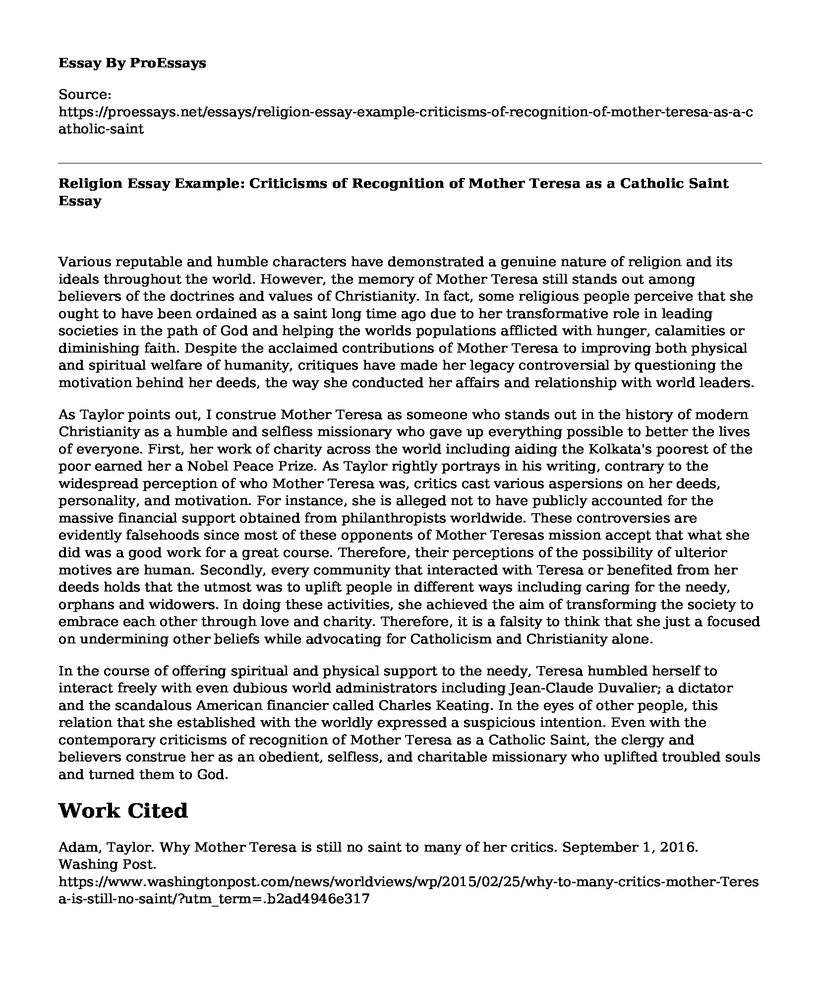Various reputable and humble characters have demonstrated a genuine nature of religion and its ideals throughout the world. However, the memory of Mother Teresa still stands out among believers of the doctrines and values of Christianity. In fact, some religious people perceive that she ought to have been ordained as a saint long time ago due to her transformative role in leading societies in the path of God and helping the worlds populations afflicted with hunger, calamities or diminishing faith. Despite the acclaimed contributions of Mother Teresa to improving both physical and spiritual welfare of humanity, critiques have made her legacy controversial by questioning the motivation behind her deeds, the way she conducted her affairs and relationship with world leaders.
As Taylor points out, I construe Mother Teresa as someone who stands out in the history of modern Christianity as a humble and selfless missionary who gave up everything possible to better the lives of everyone. First, her work of charity across the world including aiding the Kolkata's poorest of the poor earned her a Nobel Peace Prize. As Taylor rightly portrays in his writing, contrary to the widespread perception of who Mother Teresa was, critics cast various aspersions on her deeds, personality, and motivation. For instance, she is alleged not to have publicly accounted for the massive financial support obtained from philanthropists worldwide. These controversies are evidently falsehoods since most of these opponents of Mother Teresas mission accept that what she did was a good work for a great course. Therefore, their perceptions of the possibility of ulterior motives are human. Secondly, every community that interacted with Teresa or benefited from her deeds holds that the utmost was to uplift people in different ways including caring for the needy, orphans and widowers. In doing these activities, she achieved the aim of transforming the society to embrace each other through love and charity. Therefore, it is a falsity to think that she just a focused on undermining other beliefs while advocating for Catholicism and Christianity alone.
In the course of offering spiritual and physical support to the needy, Teresa humbled herself to interact freely with even dubious world administrators including Jean-Claude Duvalier; a dictator and the scandalous American financier called Charles Keating. In the eyes of other people, this relation that she established with the worldly expressed a suspicious intention. Even with the contemporary criticisms of recognition of Mother Teresa as a Catholic Saint, the clergy and believers construe her as an obedient, selfless, and charitable missionary who uplifted troubled souls and turned them to God.
Work Cited
Adam, Taylor. Why Mother Teresa is still no saint to many of her critics. September 1, 2016. Washing Post. https://www.washingtonpost.com/news/worldviews/wp/2015/02/25/why-to-many-critics-mother-Teresa-is-still-no-saint/?utm_term=.b2ad4946e317
Cite this page
Religion Essay Example: Criticisms of Recognition of Mother Teresa as a Catholic Saint. (2021, Apr 05). Retrieved from https://proessays.net/essays/religion-essay-example-criticisms-of-recognition-of-mother-teresa-as-a-catholic-saint
If you are the original author of this essay and no longer wish to have it published on the ProEssays website, please click below to request its removal:
- Essay on Anzaldua and the Deconstruction of Her Binaries
- Situational Analysis for the Cocoa Delights Organization
- A Discussion on Network Neutrality Paper Example
- Influence of Race and Racism on Canadian History - Essay Sample
- Parents of ASC Pupils: Supported by School Staff in EHCP Reviews - Essay Sample
- Essay Example on Substance Abuse: Impact on Youth and Community Development
- Response to the Article "Consecrated Counseling"







